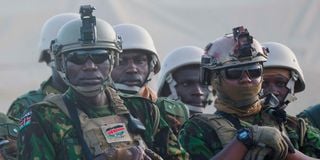
Members of the first contingent of Kenyan police stand in formation after arriving in the Caribbean country as part of a peacekeeping mission, in Port-au-Prince, Haiti June 26, 2024.
The United States, the United Nations and other international partners are yet to release funds to Kenya for the deployment of 600 police officers to Haiti, furthering concerns financial constraints that recently triggered claims of some personnel resigning.
The group, part of the UN-backed Multinational Security Support (MSS) programme, was to travel to Port au Prince after completing a course specific to handling of the gang-instigated conflict in Haiti, but is now stuck waiting at the Embakasi training centre.
The officers graduated on November 9, 2024 and they include personnel from the all-female Special Weapons and Tactics Team (SWAT), the General Service Unit (GSU), Anti Stock Theft Unit and the Rapid Deployment Unit (RDU).
Police spokesperson Resila Onyango did not respond to queries on the delay in deployment and the next steps for the 600 officers.
In early November, news agency Reuters reported that at 20 MSS officers from Kenya had served their superiors with resignation letters following delayed salary payments. Reuters cited three police officers who claimed to have served resignation letters.
The MSS in a press statement denied that any officer had resigned, and that all personnel received their salaries and allowances in full.
MSS force commander Godfrey Otunge said that the officers are committed to supporting the Haitian National Police in their mission, denying claims that the Kenyan group accused their local counterparts of secretly working with gangs.
An officer that spoke to Nation.Africa in confidence on Tuesday said that they were willing to join their counterparts in the Caribbean nation with the aim of ensuring that the country is peaceful.
“I believed that by the end of November after my graduation, I would be in Haiti. We still hope that we shall be deployed,” the officer said.
Kenya had assured Haiti that the reinforcements would travel in November, but budgetary constraints have hampered the deployment plan.
At the moment, the government has funds that can last the 400 officers in Haiti up to March next year.
“We have a budget that takes us to March next year, in terms of being able to support our officers on the ground,” President William Ruto said on October 11.
At the time, President Ruto said that Kenya and Haiti were calling on the international community to rally behind the mission and keep the promises they made.
The Haitian mission was to end in October but the United Nations Security Council Resolution 2751 (2024) extended it for another year, which, according to President Ruto, signals strong global support.
Kenya is the lead country in the ongoing security mission.
So far only Kenya and Jamaica have deployed their officers to the Multinational Security Support (MSS) Mission.
Other countries expected to deploy their officers include; the Bahamas, Antigua, Barbuda, Italy, Spain, Mongolia, Senegal, Belize, Suriname, Guatemala and Peru.
In the Caribbean nation, Kenyan officers usually hold operations alongside those attached to the Haiti National Police (HNP).
They have jointly, managed to recapture key sites such as the general hospital, the port and the National Palace which were being controlled by gangs.
There is a diplomatic tiff between Haiti and the Dominican Republic.
This is after the Haiti government raised concerns faulting the Dominican Republic for deporting Haitian nationals who had sought refuge there.
Recently, the financial constraints issue was raised with some officers saying that they had not been paid their salaries to an extent that some allegedly resigned.
Haiti has for decades been at the mercy of gangs, which forced their way into all sectors of the economy using violence.
In February 2024, there was a rise in the attacks, which led to the resignation of then-Prime Minister Ariel Henry.









